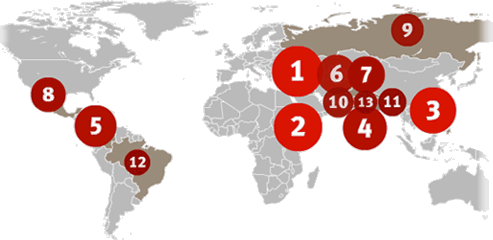As NATO and Afghan military forces faced off with militant groups, the news media worked in a hostile and uncertain environment. Two journalists were killed for their work, both during major insurgent attacks. Accusations of widespread fraud marred the second post-Taliban parliamentary elections, which were resolved only by a presidential decree that ousted several apparent winners. International aid organizations continued to pump resources into developing local media, although many Afghan outlets faced severe challenges in sustaining their work. In May, diplomatic missions circulated a memo to international journalists warning of possible kidnappings, though the threat never materialized. Three France 3 television crew members were released in June after 18 months in Taliban captivity. Abductions, which had spiked in 2009 and continued into 2010, appeared to decline during the year. Afghanistan’s mass media law, introduced in Parliament in 2003, had yet to be enacted because of a political stalemate. Under discussion were several draft versions, most of which threatened to be more restrictive.
Afghanistan
» As violence persists, two journalists are killed in crossfire.
» Abductions show decline; French-Afghan TV crew freed by Taliban.
As NATO and Afghan military forces faced off with militant groups, the news media worked in a hostile and uncertain environment. Two journalists were killed for their work, both during major insurgent attacks. Accusations of widespread fraud marred the second post-Taliban parliamentary elections, which were resolved only by a presidential decree that ousted several apparent winners. International aid organizations continued to pump resources into developing local media, although many Afghan outlets faced severe challenges in sustaining their work. In May, diplomatic missions circulated a memo to international journalists warning of possible kidnappings, though the threat never materialized. Three France 3 television crew members were released in June after 18 months in Taliban captivity. Abductions, which had spiked in 2009 and continued into 2010, appeared to decline during the year. Afghanistan’s mass media law, introduced in Parliament in 2003, had yet to be enacted because of a political stalemate. Under discussion were several draft versions, most of which threatened to be more restrictive.
Analysis: International Coverage Relies on Local Links
Local “fixers” have been essential to foreign reporters covering the Afghan war. While they often do the same work as their international counterparts, they run greater risk and face a far more uncertain future. Analysis by Monica Campbell
-
6th
Impunity Index ranking -
2
Killed, 2011 -
5
Freed from captivity -
24
Killed since 1992 -
80%
Violence, anti-
government forces
At least seven journalist murders have gone unsolved over the past decade, making Afghanistan one of the world's worst nations in combating deadly anti-press violence, according to CPJ's 2011 Impunity Index. The index calculates unsolved murders as a percentage of each country's population.

| 1. Iraq 2. Somalia 3. Philippines 4. Sri Lanka | 5. Colombia 6. Afghanistan 7. Nepal 8. Mexico | 9. Russia 10. Pakistan 11. Bangladesh 12. Brazil | 13. India |
In July, a U.S. soldier shot Ahmad Omaid Khpalwak, a reporter for the BBC and Pajhwok Afghan News, in the aftermath of a Taliban attack on government buildings in Tarin Kot. The soldier mistook Khpalwak for an insurgent.
Farhad Taqaddosi, a cameraman for Iran's Press TV, died in September of injuries sustained in a Taliban attack on prominent international buildings in Kabul.
Afghanistan is the 10th deadliest nation for the press since 1992.
1. Iraq: 151
2. Philippines: 72
3. Algeria: 60
4. Russia: 53
5. Colombia: 43
6. Pakistan: 41
7. Somalia: 36
8. India: 27
9. Mexico: 27
10. Afghanistan: 24
Two French journalists and three Afghan colleagues were freed by their Taliban captors in mid-2011. Stéphane Taponier and Hervé Ghesquière, journalists with the French public service channel France 3, and Afghan interpreter Reza Din were released on June 29 after a lengthy captivity. Their local driver and fixer had been quietly released a few weeks earlier. The crew members had been working on a story about road reconstruction east of Kabul when they were seized in late 2009.
Recent, long captivities:
547: Days that Taponier, Ghesquière, and Din were held by the Taliban in 2009-11.
223: Days that U.S. journalist David Rohde and Afghan reporter Tahir Ludin spent in Taliban captivity in 2008-09.
167: Days that British journalist Asad Qureshi spent in captivity in Pakistan in 2010.
157: Days that Japanese journalist Kosuke Tsuneoka spent in captivity in Afghanistan in 2010.
Fatalities in Afghanistan have run counter to many worldwide trends, CPJ research shows. International journalists constitute about two-thirds of victims, a proportion far higher than global trends. Murders made up only about half of the fatalities--far lower than the worldwide proportion--with deaths in combat and other dangerous assignments constituting the rest.
A closer look at fatalities in Afghanistan since 1992:
Victims: 67 percent were international journalists, well above the worldwide proportion of 13 percent.
Type of death: 54 percent were murders, 38 percent occurred in combat, and 8 percent stemmed from dangerous assignments. Worldwide, 71 percent of media fatalities were murders.
Freelancers: 21 percent of victims were freelancers, above the worldwide proportion of 14 percent.
Taken captive: 54 percent of murder victims were taken captive first, well above the worldwide rate of 23 percent.
Measuring all types of violence, the Brookings Institution found that anti-government forces were behind an increasing proportion of attacks in recent years. In the first six months of 2011, anti-government actors accounted for the vast majority of all types of violence.
